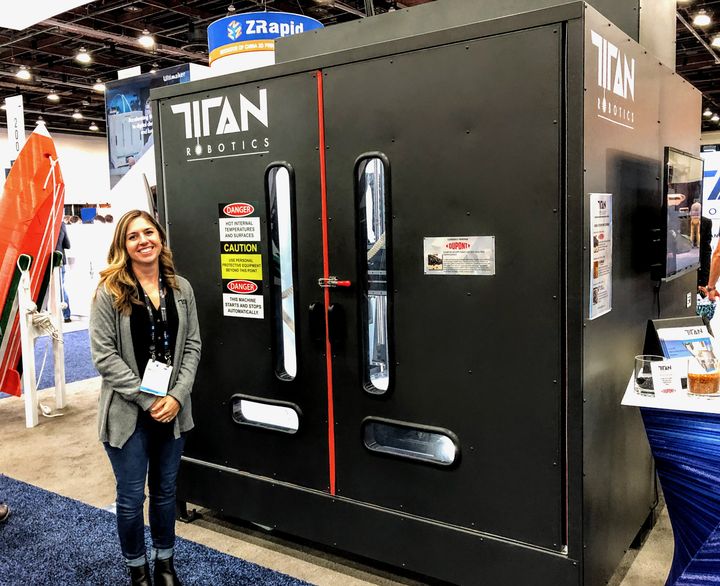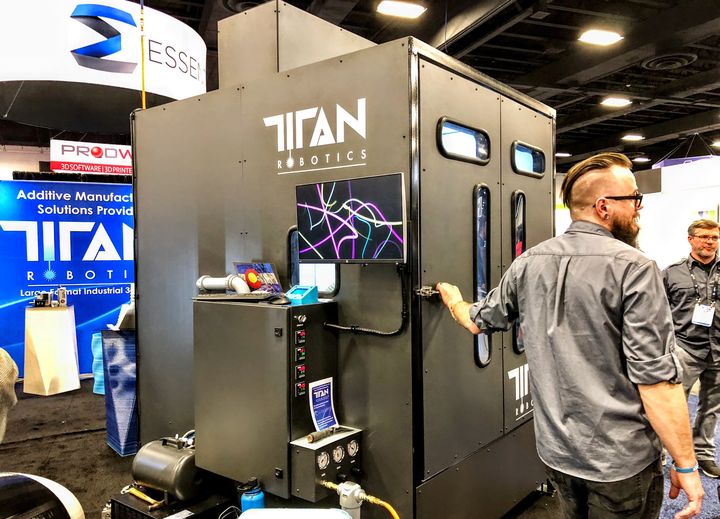
Titan Robotics beefed up their production 3D printing offerings with a new partnership with Jabil.
Titan Robotics is a very interesting company from Colorado, where engineer and CEO Clay Guillory founded the company in 2014. We first saw them about a year later when they presented their first machine, the open-air, large-format Atlas device. It was one of the biggest 3D printers I’d ever seen at the time.
Since those early days things have changed significantly at Titan Robotics. You can read our account of their origin story here.
Large-Format 3D Printing Challenges
Along the way Titan Robotics made a number of discoveries about the perils of large-format 3D printing. One of their first challenges was the issue of print duration. If using standard extrusion approaches on large 3D models, the print times were excruciatingly long. Titan Robotics worked on methods to increase the flow of thermoplastic to reduce those print times.
Another challenge was print cost. It’s one thing to 3D print a fist-sized object and pay a few dollars for the material, but when you’re producing objects the size of a bathtub the cost is notably larger. This cost in some cases precluded the use of large-format 3D printing because it vastly exceeded the cost of traditional making processes.
Again, Titan Robotics reacted by developing a pellet extrusion system that could be used instead of standard 3D printer filament. The pellets are significantly less expensive than 3D printer filament, largely because 3D printer filaments is MADE FROM pellets. By using pellets you effectively cut out an entire step in the materials supply chain. Also, pellets are most often sold in bulk at very low commodity prices.
New 3D Printer Production Challenges

Today Titan Robotics faces yet another challenge, one that is facing many 3D printer manufacturers seeking to sell equipment for production use: materials.
Because early 3D printers had the ability to access only a very small set of materials, their use in industry was limited. In many cases an equipment option is routinely discarded if it cannot produce objects in the required engineering materials. That was a significant barrier for the industry for quite some time, and is only now beginning to break down.
Production users, now attracted to the idea of 3D printing, are increasingly demanding many different types of engineering materials for use on their 3D printers. Fortunately, the design of many equipment options now allows for the use of unusual materials.
But even if a machine can 3D print a material, it still has to be available and certified for use.
That’s why many 3D printer manufacturers these days are partnering up with chemical companies: they gain access to powerful materials in the chemical company’s catalog, sometimes for exclusive use on their machines. That’s important, as the demands of manufacturing engineers for specific materials would then lead directly to that 3D printer manufacturer.
In a way, it’s slowly becoming a requirement for production 3D printer manufacturers to have access to more advanced materials.
Titan Robotics and Jabil
That’s why Titan Robotics has partnered up with Jabil. They say:
“Titan Robotics, Ltd. today announced a strategic collaboration with Jabil Inc. to accelerate the adoption of large-format, industrial additive manufacturing. Jabil Engineered Materials, a unit of Jabil, which develops innovative polymer formulations and compounds at its ISO 9001 Materials Innovation Center, is working with Titan to qualify and integrate customized materials for use on Titan’s pellet-based Atlas 3D printers.”
This may come as a surprise to some, as Jabil is generally viewed as a major manufacturing solutions provider, and not necessarily a materials provider. However, their business is so massive that they can easily justify the existence of a specialized materials unit as above, and Jabil Engineered Materials debuted early last year. (You can read more from Jabil execs on that introduction here, and more updates from this summer at Jabil Additive here.)
For Titan Robotics, this arrangement could open doors to many more opportunities to sell their powerful pellet-based equipment.
It seems that Titan Robotics has not only large 3D printers, but also will have a larger customer base.
Via Titan Robotics
